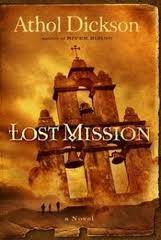Magic Realism, Part 3
“What if I promised you that you would be able to see clearly all the way to where the earth and heaven meet?”
I peered up at it. When I looked at it, I saw clearly. When I looked away, all was dark again. But I had not lived my life as an orphan for nothing. I did not give my trust easily. “Why should I want to see that?”“Why should you want to miss it?” The creature scolded me with a hiss. “You are asking the wrong questions, Wen Ming. You have not asked who I am or why I call to you.”
“I think you are an evil spirit.”
“Or I might just be your imagination. Since your world is so small, I suppose you don’t have much else to do other than create monsters in your mind.”
— Lucky Baby, by Meredith Efken (Howard Books, 2010)
Is perception a pipe dream? We must in some sense say yes. Sensory input and memory are both subject to the vagaries of a brain originally designed for accurate perception, but subject to the corruption of sin—in a purely spiritual sense, and in the corruption of a universe that groans under the weight of entropy.
Christians are taught in no uncertain terms that the two options are to rely firmly on a clear doctrinal framework, or discard it for the morass of experientialism. Neither is entirely reliable, and it’s for this reason, I’d suggest, that we walk by faith—not by sight.
 There probably could not be a title better matched to its story than Athol Dickson’s Lost Mission. Part of the novel’s fantasia is its incredible voice. With zero contortion or contrivance, we encounter a Hispanic-accented narrator who begins a forgotten story. Over and over, as the smoke of fires drifts mysteriously upstream, against the wind, the scene shifts between time and place as if the universe’s continuum were a fluid fog.
There probably could not be a title better matched to its story than Athol Dickson’s Lost Mission. Part of the novel’s fantasia is its incredible voice. With zero contortion or contrivance, we encounter a Hispanic-accented narrator who begins a forgotten story. Over and over, as the smoke of fires drifts mysteriously upstream, against the wind, the scene shifts between time and place as if the universe’s continuum were a fluid fog.
Over and over again, the questionable power of broken faith seeks to build the kingdom of God. And suffers the plague that besets mankind—in literal and figurative form. We come face to face with a world that turns onward in relentless oblivion to the spiritual, seen through a curtain where time does not matter. The best-laid plans of mice and men go aft agley; yet lostness and aloneness have a witness.
No name or persona is credited to the narrator, though he is unquestionably there. No need is felt to attribute his existence to the personage of an angel, a demon or the voice of God—the three stock choices of Christian fiction. The narrator is so very real, however, that the standard advice to avoid author intrusion is inapplicable. He is a character, an undefined one. He simply exists, and his presence is truthful in the vein of I think, therefore I am.
This concept of a witness to the mystical is far from the American evangelical testimonial pattern—another breach with standard practices in Christian fiction. Not only does it defy the tidy cookie-cutter, it challenges our ingrained need to establish an authoritative source in connection to the work’s argumentation. God stuff, good. Agree with God, unless the writer runs afoul of one’s personal image of God, in which case label as suspect. Angels, good unless a deceiving angel. Angels, controversial. Demons, bad. Oh, okay, easy. This approach to categorizing all spiritual fantasia by a personal hit list of good and evil is less real than we think.
Moreover, it’s a truly flawed approach to fiction. The imposition of analysis is both a cause of the complaint that Christian writing is inferior, and an open door to false doctrine, because we cannot structure a book with much for spiritual specifics at all if it’s going to be analyzed and discarded according to the tyranny of postmodern personal preferences. If the biblical fantasium—which is in fact more real than we want—need be invoked, might it not be better to allow it to stand on its own two feet?
In the ultimate Christian narrative, it’s far from strange to diverge from the modern and postmodern schizophrenic blend of experientially rationalistic foci:
“How then were your eyes opened?” they asked.
He replied, “The man they call Jesus made some mud and put it on my eyes. He told me to g to Siloam and wash. So I went and washed, and then I could see.”
“Where is this man?” they asked him.
“I don’t know,” he said.
They brought to the Pharisees the man who had been blind. Now the day on which Jesus had made the mud and opened the man’s eyes was a Sabbath. Therefore the Pharisees also asked him how he had received his sight. “He put mud on my eyes,” the man replied, “and I washed, and now I see.”
Some of the Pharisees said, “This man is not from God, for he does not keep the Sabbath.”
But others asked, “How can a sinner perform such signs?” So they were divided…
A second time they summoned the man who had been blind. “Give glory to God by telling the truth,” they said. “We know this man is a sinner.”
He replied, “Whether he is a sinner or not, I don’t know. One thing I do know. I was blind but now I see!”
John 9: 10-16, 24-25
The moral point of the incident, the medical reasoning behind the Saviour’s treatment, and the relative position of the blind man in symbolic relation to the generic American saved soul have been treated and mistreated with great fortitude. Since the recipient of this magically real act was unwilling to give a full and proper testimonial, we are only doing our duty by filling in the missing pieces.
But that’s much too easy. As we struggle and fail to build a kingdom that can only be built without hands, or at least a pleasant substitute thereof, we forget—we long to forget—that sometimes, there is a thing that happens. That in the redeeming hands of God, entropy can be as much magical and as much real as miracle.
There—in the presence of God’s touch—is the lost edge of magic realism. When perception and truth meet, we accept the risk that we’ll be blind; or that, perhaps, we’ll see as never before.
I gave the creature the most obscene hand gesture I knew. “My sight is only the size of a fen coin. Everything else has been taken from me. Why do you want my sight?”
“I don’t want it. I’m only here to take it.”
Stay on the ground where it was safe, or climb the trees and take my chances? If the beast did not lie, I could at least taste the independence of climbing a tree before losing my sight entirely.
I would take the chance.
Cathi-Lyn Dyck has been a published writer and poet since 2004, and a freelance editor since 2006.
She can be found online at ScitaScienda.com.








































This is all very interesting, but I don’t follow it very well. Can I ask for some clarification? I’ve never had a philosophy course or anything, so please bear with me.
I understand the world being oblivious to the spiritual, but what is the “curtain where time does not matter” through which we “see”?
Are you talking about God — the One Who Exists without any need for explanation? Or are you talking about all consciousness? And what is being narrated?
I dislike the evangelical emphasis on a testimony — a conversion experience — since I grew up in an evangelical family and have therefore have no real conversion experience to speak of, since I’ve always gone to church and was “saved” almost before I can remember. However, I don’t see how a Christian testimony is not the witnessing of the mystical (even though most evangelicals probably don’t like the word “mystical”). Isn’t a moment of salvation a mystical encounter in that it’s inexplicable? The new Christian could never have reformed him/herself by his own strength.
What? I’m totally confused here. Isn’t entropy decay and chaos? Isn’t chaos ultimately evil — discordance from God’s perfectly harmonious plan for all of existence? I think entropy could only be ugly, not “magical.”
Finally, I don’t understand the direct relevance of the closing quote. Maybe it’s somehow about faith, but I don’t really get it.
Although I can’t claim to know the author’s intentions, I would say that entropy is a miracle because God saves us through our blindness and weakness. It’s a kind of koan, I think. Speaking plainly is not always the best recourse.
@Paul Lee
Thanks for bearing with me through the ambiguity!
I may not have provided enough background there. It’s the structure and the narrative style of Athol Dickson’s story. The book’s storyline weaves back and forth across several hundred years, yet the narrator is privy to the whole picture in a way that the characters are not.
No, interestingly, Mr. Dickson never names or defines his narrator. The moral premise of Lost Mission is the main subject of the narration, but it’s set in such mystical terms that it’s very open to the reader’s own perspective.
The OP is 800ish words of me agreeing with you. 🙂 As you say, there’s no dichotomy in the reality; the split exists due to prevailing cultural perceptions. I’d say that what we have invented and defined as a testimony is packaged down into a small part of the whole.
Well, entropy is the tendency toward maximum disorder (chaos), but it isn’t chaos. Also, while decay implies rot, entropy doesn’t necessarily; it’s general enough to invoke a slippage into less-specific organization, or an irreversible transfer between matter and energy. There’s no moral value to the transfer, the matter or the energy, mores being spiritual.
My suggestion is that temporal entropy can cause damage and difficulty–even death–but the moral element of such things presides from a higher plane, located in the very character of God. The presence and working of God, seen or unseen, defines all moments regardless of whether we perceive them as “evil” or “good.”
In Meredith’s book, Wen Ming is going blind, and her disability pretty much rules her out of ever qualifying for adoption. Being deserted is the great evil of her life; it’s her first memory, and it keeps happening. Then along comes a dragon–a fate–seeking to turn this foundational truth on its head for her.
I think Jill’s reference to a koan, a riddle that flies against rationality in order to enlighten, is particularly suitable to that kind of phenomenon. The world is littered with koan, or so it seems to me.
Probably, better context on my part would help here too, as with Mr. Dickson. Meredith’s scene here isn’t really about faith, just as her dragon isn’t about evil. Call it my fault for a less-than-clear closing in my own text, perhaps?
My final statement is about choosing to take on the risk inherent in attempting to see truth through the lens of flawed perception: we may well fail to find the conjunction of earthly and heavenly perspective. And the risk of failure may cause us to lose any desire to try. Is there anything more challenging or more painful than seeking and failing to see God in the darkness?
In the next moment of Meredith’s story, the nearly-blind girl Wen Ming accepts that risk, implied in the dragon’s promise of seeing the world in a whole different way: clearly, all the way to where earth and heaven meet.
Hope that helps!
~Cat
I’m still having difficulty understanding this. I think the miracle or magic in entropy lies solely in its reversal through divine intervention.
It is related to faith, then, since faith is just that — trying valiantly to see into the impenetrable fog. But what is the real risk? Can we seek God and not find Him? On the other hand, can we really ever be “successful” in finding any sort of harmony of perspective, since we can never understand our universe or our own condition well enough to satisfy all our needs?
I’m not sure what you mean by pipe dream. Either way,
Which is a bit of a false polarization, as you say, because you can’t separate your understanding of the world from your experience. But I’d also add that I don’t think faith is blind – Rather, faith is built on the past and upon realities that exist whether we can explain them or not. In the parable cited, for instance, it’s not the healing that’s in question, but the source. The blind man’s faith was in believing the man he couldn’t see would heal him as promised.
Which is interesting, and leads room for him to be anything from human to alien, from god (little ‘g’ on purpose) to demon, from disembodied spirit to pixie.
Random aside: Some friends and I once worked that out to “I think, therefore I am dead.” If you can think yourself into existence, you can think yourself out of it.
I just really want to keep rereading this section for awhile. I hadn’t thought of oversimplification and categorization as an open door to false doctrine.